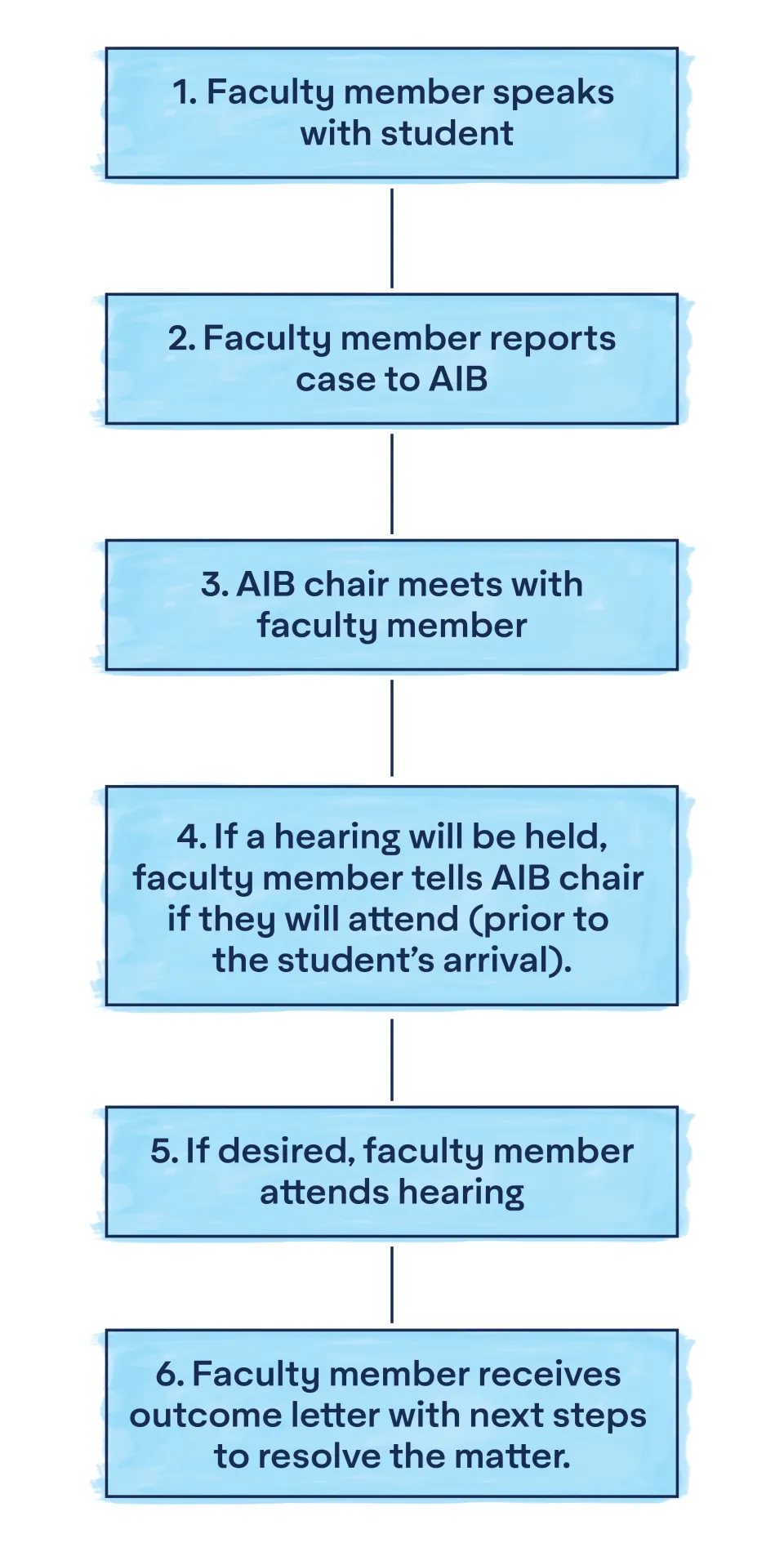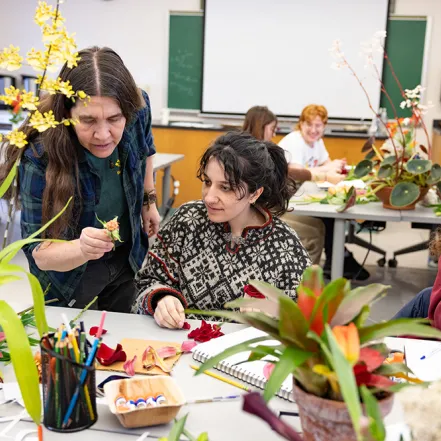Academic Integrity Board Information for Faculty
Smith students are committed to developing their minds in college. Multiple factors, such as increasing uncertainty and the emergence of generative AI, have complicated the way that students think about academic integrity. Read about how you can help students maintain their academic integrity, and what to do if you suspect a student has violated the academic integrity statement.
To report a case to the AIB, please use the Academic Integrity Board Reporting Form.
If You Report a Violation

What should I do if I am worried that a student broke the Academic Integrity Statement?
Invite the student to talk about the situation. Approach the conversation non-judgmentally and with an open mind. If, after you speak to the student, you still suspect academic dishonesty, inform the student that you are reporting the situation to the Academic Integrity Board.
What if I suspect that a student has used generative AI to complete an assignment or exam? Should I use AI-detecting software?
“Proving” that the work someone has submitted as their own was actually generated by AI is not a straightforward task. A number of studies indicate that AI-detecting software can be an unreliable indicator of whether content was generated by AI. Some have even shown that work by certain people, like non-native English speakers and those who are neurodivergent, is more likely to yield false positives (being wrongfully identified as generated by AI). For this reason, you should never rely on this software to prove that a student has used generative AI. We strongly encourage faculty members to learn about the limitations of AI-detecting software. The AIB does not rely on the results of AI-detecting software to make decisions about cases.
What should I do if I am worried about the academic integrity of a group project?
You should speak to each student individually and approach the conversation in the same way as you would if the situation involved just one student. If it becomes clear that only one student was involved in breaking the Academic Integrity Statement, then report just that student. If, after the conversations, you are worried that more than one student was involved, then report each student to the AIB.
What if I know that a student broke the Academic Integrity Statement, but I don’t think they’ll do it again. Should I not report the situation to the AIB?
You should submit the case to the AIB. The mission of the Board is to have educational interactions with students and faculty. One of our goals is for every student who interacts with the Board to learn more about why academic integrity is important. We also keep records of all cases. It is important to keep track of students who appear before the AIB multiple times. If you refrain from reporting a student, you take away an opportunity for the AIB to help the student learn more about the importance of academic honesty, and you remove the AIB’s ability to track students with multiple violations.
I know that a student broke the Academic Integrity Statement, but I would rather handle it myself than submit it to the AIB. Is that OK?
The AIB strongly encourages you to submit the case to the Board. Because you are the student’s professor, it is helpful for you to take a neutral stance in the situation and allow the AIB to handle it. You may continue to assess the student’s work for the current course or one in the future, and we want both you and the student to be able to continue to teach and learn without the complication of your having decided how the situation should be handled. The Board also tracks trends in various kinds of violations. If we do not receive all of the cases, we do not have a clear picture of these trends.
I’m worried that if I submit a student to the Academic Integrity Board, they will get in big trouble. I don’t want to be responsible for that. What should I do?
You should know that the AIB is driven not by a punitive mandate, but by an educational mandate. When a student has violated the Academic Integrity Statement, the Board’s most common sanction is to lower the grade on the piece of coursework in question. The Board almost never recommends a consequence harsher than the deduction of a grade. That happens only in cases of repeated egregious violations with no indication that the behavior will cease. The Board strives to have meaningful and thoughtful conversations with students. When you submit a case to the Board, the Board will treat the student fairly, kindly, and respectfully. The Board does not make value judgments in its work with students. The Board finds many times that students appreciate the opportunity to discuss and learn from the situation.
Faculty interested in serving on the Academic Integrity Board should contact the associate dean of the college.
If You Suspect a Violation
Invite the student to talk about the situation. Approach the conversation non-judgmentally and with an open mind. If, after you speak to the student, you still suspect academic dishonesty, inform the student that you are reporting the situation to the Academic Integrity Board.
This initial conversation is a vital part of the process. It helps to keep the student-teacher relationship intact by allowing the student to hear that you are not making a value judgment. It also allows for the possibility that, if there is a misunderstanding, it can be cleared up before a case is reported.
The AIB strongly encourages faculty to submit all cases of suspected violations to the Board. From an equity standpoint, it is simply unfair to students when some faculty are more likely to report cases than others. Keep in mind that the AIB takes its work very seriously. When the AIB works with a student, it works hard to find the educational opportunity for the student in the situation. For students who are found to have violated the Academic Integrity Code, the most common outcome is a deduction of the grade on the piece of coursework in question. It is also important that the AIB can keep track of students who are found in violation multiple times and of trends in student academic behaviors. The Board cannot do this if faculty do not report cases. There is much to be learned from knowing how students are approaching their academic work. For example, from the uptick in cases related to the use of generative AI, we have learned that many students are relying on generative AI to help them complete their coursework. When the Board shares this with the faculty, we can begin to think about this trend’s implications as well as strategies for dealing with it.
Generative AI & Students’ Academic Integrity
The Academic Integrity Board has seen an increase in cases regarding the use of generative AI. It would be safe to assume that a large proportion of your students are at least experimenting with this technology. This does not mean that all students are using generative AI to behave dishonestly. Students are using generative AI as learners in many ways. They use AI as a study partner, generating quiz questions or alternative explanations of concepts. They use AI to summarize readings and generate lists of sources. As a faculty member, the AIB encourages you to learn about the ways that students use generative AI and make decisions about what you will allow in a given course. For example, if your course focuses on building students’ critical reading skills, you might state that students are not allowed to use generative AI to summarize course readings.
The AIB encourages faculty to speak with students about the importance of developing one’s own voice as a writer. When the AIB sees papers that are generated by AI, we often can tell students that the papers lacked a clear point of view or a strong voice. We want Smith students to develop their own unique voices as thinkers and writers. Using generative AI to write a paper removes an opportunity to develop that voice. It is the student’s voice we want to hear, not the voice of generative AI. Talk with your students about what is sacrificed if they use AI to substitute for their own thinking.
If you are committed to teaching your students how to use generative AI responsibly, please consider sharing your assignments with colleagues. As we learn more about how generative AI works and as its capabilities evolve, we can benefit from sharing knowledge and strategies as we work to provide our students with a strong education in critical thinking.
